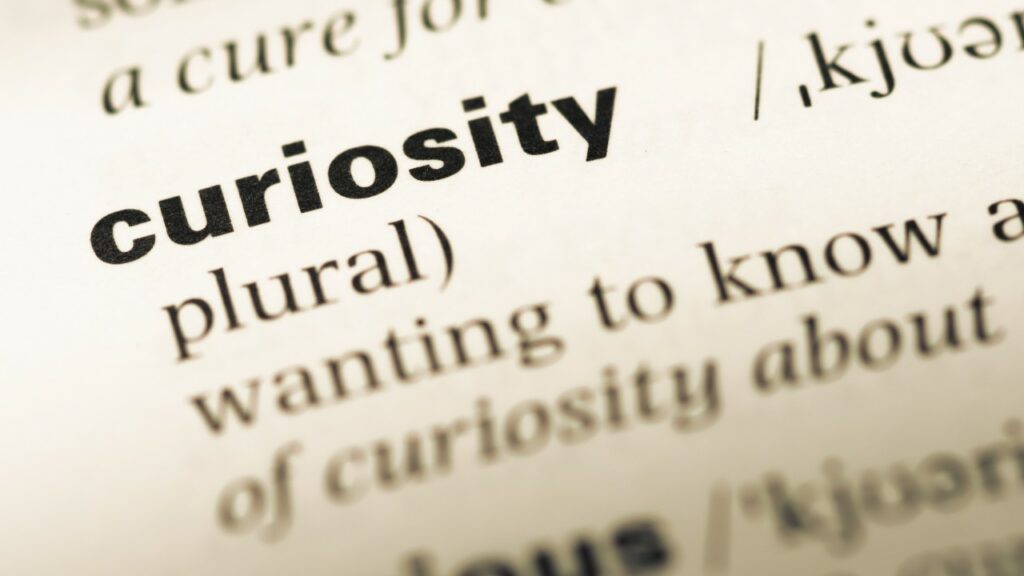“Sell your cleverness and buy bewilderment. Cleverness is mere opinion. Bewilderment brings intuitive knowledge.” -Rumi
This old saying reminds me that while there are certain qualities that we’ve come to expect of our leaders–vision, strength, wisdom, to name a few–there is one superpower that every good leader has that we don’t talk about enough: curiosity.
It’s a strange irony that the skills one employs to become a leader are not the same ones that necessarily make you a good leader. On your way up, you need to be a subject matter expert in your area, mastering independent expertise around specific things. This is what I refer to as the “doing” phase of your career. When you’re the leader of a whole organization, you can’t be the subject matter expert of all the things that are happening beneath you. Your job is to organize, provide vision, and to manage. You have to rely on others for the details.
The thing is, you can’t bridge that gap between “doing” and “leading” without a new skill set- healthy curiosity.
Curiosity is a muscle that can be developed and strengthened overtime. The old leadership stereotype of the all-knowing, decisive, infallible leader is a myth. A leader who tries to play that role is setting themselves up for failure. Best case scenario for this kind of leader is that they simply get stuck when confronted with a situation they don’t understand or haven’t yet encountered. Worst case is they make up an answer off the top of their head, something that board members, clients, and partners won’t tolerate for long.
The first step to embracing curiosity is getting comfortable admitting what you don’t know (everything). Adopt a healthy understanding of where your expertise lies and where it does not. The next step is to acknowledge that you don’t even know some of the things you don’t know. Once you’ve developed this kind of humility, then you need to work up the courage to act on it. As the Rumi quote at the beginning of this column notes, selling your cleverness for bewilderment, leads you to knowledge.
There are many ways you can develop your practice of being a curious leader:
Ask open-ended questions
Questions that have yes or no answers frequently don’t help you get to the core of an issue. Instead, ask questions that use the words why, what, and how. Get people talking and listen to what they say.
Seek out the expertise in your world
Once you’ve admitted that you’re not the expert on everything, you need to figure out who is. Understand that there are people in your organization and network sitting on immense amounts of expertise and institutional knowledge that is invaluable to you. Seek them out, ask them questions, spend time with them.
Build a culture grounded in psychological safety
If you’re surrounded by people who only tell you what they think you want to hear, then you will not be able to lead. People won’t tell you what they know unless they feel psychologically safe. Reward people for telling you hard truths. Acknowledge the skill set it takes when an employee says, “I don’t know, but I can find out.” Don’t reward behaviors that curry favor and share selective feedback/information.
Get out of your echo chamber
Even in organizations where everyone is sharing honestly, the information can lack perspective. A leader needs to gain fresh perspectives. Ask your friends, peers, partners, anyone you think might have a new perspective or different experience. Don’t dismiss ideas out of hand because it’s not something you “typically” do or hear.
Peeling back the layers
Get in the habit, every once in a while, of digging a little deeper. You never know what you’ll find a couple layers beneath that assumption. Simon Sinek’s 5 whys is a great example of how things can change when peeling back the layers of your “why.” The only way to get there is to approach things with an open and curious mind. Your favorite new phrase can be “tell me more.”
Healthy curiosity
It’s amazing how often we ignore our instincts in the workplace, and simply move on even though there was something funky that caught our attention briefly. Why don’t these numbers quite align? Why is the controller working late? Why is the project lead making a lot of deep sighs in the meeting? Likewise when you hear things like “that’s how we’ve always done it,” or “that’s just noise in the system,” or “I’ve given up trying to fix that.” These are all opportunities to get curious.
Not long ago I spoke with a leader whose finance director came into a regular meeting saying, “we need to start laying people off.” Rather than panicking or jumping into problem solving, the leader in question instead got curious. What was driving that assumption? What’s behind these numbers? Turned out that a major funder was late with its grant reimbursements, and that there was a whole other story behind that. In the end, layoffs weren’t really the right response to the problem.
Curiosity doesn’t cost much, perhaps other than a slice of humble pie and it pays magnificent dividends.

